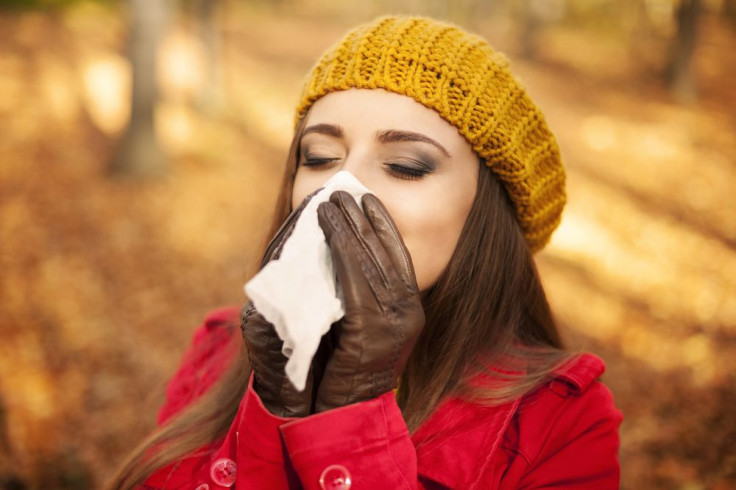Allergies Linked To Increased Blood Cancer Risk In Women: Which Allergy Increases Lymphoma Risk The Most?

The sneezing, wheezing, coughing, and itchiness triggered by allergies tend to be more common with the change of the seasons, especially in the spring, when pollen levels tend to be the highest out of the year. Airborne allergies, particularly referring to plants, grass, and trees, may increase the risk of blood cancers in women, according to a recent study.
The Asthma and Allergy Foundation of America says an estimated one in five Americans suffer from all types of allergies, which include indoor and outdoor, food and drug, latex, insect, skin and eye. Allergies continue to be the fifth leading chronic disease in the U.S., among all ages, which affect the human immune system. When the body encounters a foreign substance — known as an allergen — whether it's eaten, breathed into the lungs, injected, or touched, their body reacts with coughing, sneezing, itchy eyes, a runny nose, or a scratchy throat. In more severe cases, allergies can cause rashes, hives, difficulty breathing, asthma attacks, low blood pressure, and even death. The onset of allergies deregulates the immune system and may even affect the survival of cells in developing tumors.
Researchers at the Fred Hutchinson Cancer Research Center investigated the association of chronic immune stimulation and the development of blood cancers in a large group of men and women. The participants in the study were gathered from a large, population-based sample of men and women from the VITamins and Lifestyle cohort, who were between 50 and 76 years old, from Washington State.
The researchers followed more than 66,000 participants for an average of eight years until they either withdrew from the study, moved away; had a cancer diagnosis that wasn't a hematologic malignancy (cancer of the blood or bone marrow) or non-melanoma skin cancer, or died. The incidence of cancer was monitored via the Surveillance, Epidemiology and End Results (SEER) cancer registry of western Washington.
To accurately assess types of allergies and blood cancer risk, researchers asked the participants to complete a 24-page questionnaire that focused on three major areas: health history and cancer risk factors, medication and supplement use, and diet. Additionally, they were required to provide information on age, ethnicity, education, smoking, diet (fruit and vegetable intake), other lifestyle characteristics, self-rated health, medical history, and family history of leukemia or lymphoma.
During a follow-upm the researchers found that 681 participants developed a hematologic malignancy. These participants were more likely to be male, to have two or more relatives with a family history of leukemia or lymphoma, and to be less active, considering their health status as poor.
Airborne allergies, specifically from plants, grass and trees, were the most significantly linked to hematologic malignancies, and was associated with an increased in mature B-cell neoplasms, one of the four major categories of lymphoma. Participants who reported a history of allergies to cats, dogs, or other animals were also at an increased risk of plasma-cell neoplasms.
"If your immune system is over-reactive, then you have problems; if it's under-reactive, you're going to have problems. Increasing evidence indicates that dysregulation of the immune system, such as you find in allergic and autoimmune disorders, can affect survival of cells in developing tumors," Mazyar Shadman, M.D., first author of the study and a senior fellow in the Clinical Research Division at Fred Hutchinson Cancer Research Center, said in a press release.
With regards to gender, the researchers found that the incidence of blood cancers in response to allergens was more in women than in men. The reason for this has yet to be discovered. The types of allergy medication the participants used was not accounted for because it is difficult to eliminate allergy treatment as a confounding variable — most people with allergies are on some sort of medication. However, allergy medications are not known to cause cancer, wrote the researchers.
The findings may also be skewed since the authors relied on self-reporting of allergies and only solicited answers about the participants’ current allergies. According to LiveScience, most people first develop allergies as children or infants but with age they sometimes outgrow them, although it is not known exactly why. The study suggests further research is needed to examine the hormonal effects on women's immune system, and their interactions with carcinogenesis that may provide an explanation to gender's role with allergies and blood cancer.
In the U.S., there are currently more than one million people living with, or in remission from leukemia, Hodgkin lymphoma, non-Hodgkin lymphoma, or myeloma, according to the Leukemia & Lymphoma Society. These blood cancers affect bone marrow, blood cells, lymph nodes, and others parts of the lymphatic system, resulting from acquired changes to the DNA of a single stem cell.
To learn more about blood cancers, click here.
Source: De Roos AJ, Shadman M, Walter RB, et al. Associations between Allergies and Risk of Hematologic Malignancies: Results from the VITamins and Lifestyle Cohort Study. American Journal of Hematology. 2013.
Published by Medicaldaily.com



























